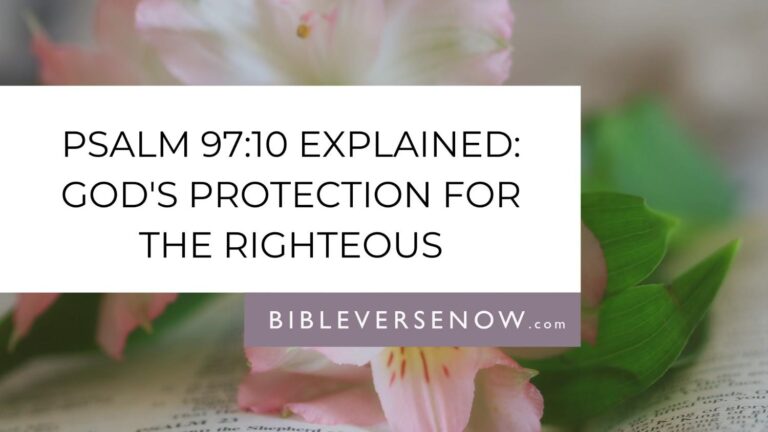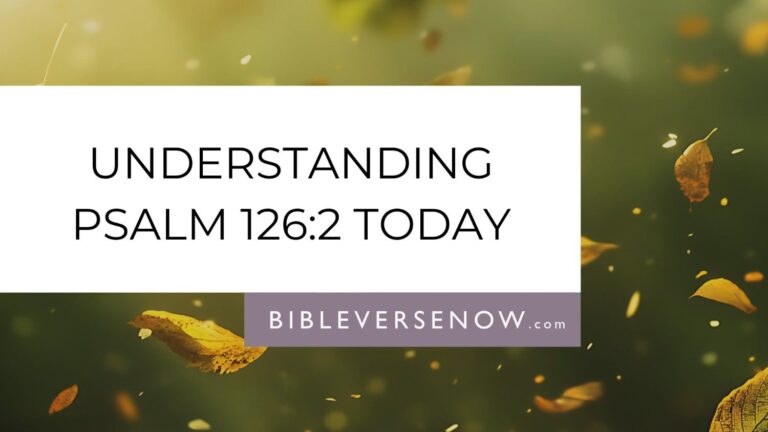Resentment can feel justified when someone has wounded you deeply, but holding grudges becomes a prison that locks your heart away from God’s peace. The weight of unforgiveness doesn’t punish those who hurt you—it slowly destroys your own soul, stealing joy and blocking the flow of God’s grace in your life. Scripture offers profound wisdom about releasing grudges and embracing the freedom that comes through biblical forgiveness. These carefully selected Bible verses about holding grudges will guide you toward healing and help you understand God’s heart for reconciliation, even in your deepest pain.
What the Bible Says About Holding Grudges
The Bible consistently teaches that holding grudges goes against God’s design for our hearts and relationships. Scripture reveals that resentment creates barriers between us and our Heavenly Father, while forgiveness opens the door to supernatural peace and restoration.
Leviticus 19:18 reminds us of God’s fundamental command: “Do not seek revenge or bear a grudge against anyone among your people, but love your neighbor as yourself. I am the Lord.” This Old Testament foundation shows that releasing grudges has always been central to God’s plan for His people.
Colossians 3:13 builds on this truth: “Bear with each other and forgive one another if any of you has a grievance against someone. Forgive as the Lord forgave you.” Paul connects our forgiveness of others directly to the forgiveness we’ve received from Christ, making it clear that grudge-holding contradicts the gospel itself.
The Apostle Peter learned this lesson personally when he asked Jesus about forgiveness limits. Matthew 18:21-22 records his question and Jesus’ stunning response: “Then Peter came to Jesus and asked, ‘Lord, how many times shall I forgive my brother or sister who sins against me? Up to seven times?’ Jesus answered, ‘I tell you, not seven times, but seventy-seven times.'” Jesus wasn’t setting a mathematical limit—He was calling for unlimited forgiveness that mirrors God’s grace toward us.
Bible Verses for When Someone Has Hurt You Deeply
When betrayal cuts deep and anger feels more natural than forgiveness, these verses speak directly to your wounded heart:
Ephesians 4:31-32 addresses the raw emotions that fuel grudges: “Get rid of all bitterness, rage and anger, brawling and slander, along with every form of malice. Be kind and compassionate to one another, forgiving each other, just as in Christ God forgave you.” Notice that Paul doesn’t minimize the pain—he acknowledges bitterness and rage while pointing toward a better path.
Romans 12:19 offers comfort when you want justice: “Do not take revenge, my dear friends, but leave room for God’s wrath, for it is written: ‘It is mine to avenge; I will repay,’ says the Lord.” This verse doesn’t dismiss your need for justice—it reassures you that God sees every wrong and will handle what you cannot.
1 Peter 3:9 challenges you to break the cycle of hurt: “Do not repay evil with evil or insult with insult. On the contrary, repay evil with blessing, because to this you were called so that you may inherit a blessing.” This doesn’t mean accepting abuse, but rather choosing not to perpetuate harmful patterns.
Mark 11:25 connects forgiveness to your prayer life: “And when you stand praying, if you hold anything against anyone, forgive them, so that your Father in heaven may forgive you your sins.” Jesus shows that unforgiveness creates spiritual interference that affects your entire relationship with God.
Scripture About Family Grudges and Broken Relationships
Family conflicts often create the deepest wounds and longest-lasting grudges. These verses offer hope for healing damaged family bonds:
Genesis 50:19-20 shows Joseph’s response to his brothers who sold him into slavery: “But Joseph said to them, ‘Don’t be afraid. Am I in the place of God? You intended to harm me, but God intended it for good to accomplish what is now being done, the saving of many lives.'” Joseph’s ability to see God’s sovereignty in his suffering enabled him to release his right to revenge.
Matthew 5:23-24 addresses the urgency of family reconciliation: “Therefore, if you are offering your gift at the altar and there remember that your brother or sister has something against you, leave your gift there in front of the altar. First go and be reconciled to them; then come and offer your gift.” God values restored relationships more than religious rituals.
Luke 15:20 illustrates the Father’s heart for reconciliation through the parable of the prodigal son: “But while he was still a long way off, his father saw him and was filled with compassion for him; he ran to his son, threw his arms around him and kissed him.” This verse reveals how God responds when we turn from holding grudges toward reconciliation.
Proverbs 17:9 shows the power of letting go: “Whoever would foster love covers over an offense, but whoever repeats the matter separates close friends.” Sometimes the most loving thing you can do is choose not to rehearse old wounds.
Bible Verses About Forgiving Those Who Don’t Apologize
One of the hardest aspects of releasing grudges comes when the person who hurt you shows no remorse. These verses guide you through unilateral forgiveness:
Luke 23:34 records Jesus’ words from the cross: “Father, forgive them, for they do not know what they are doing.” Even while dying unjustly, Jesus chose forgiveness for people who showed no repentance. His example shows that forgiveness is often a gift we give regardless of the recipient’s response.
Matthew 6:14-15 makes the stakes clear: “For if you forgive other people when they sin against you, your heavenly Father will also forgive you. But if you do not forgive others their sins, your Father will not forgive your sins.” This isn’t about earning salvation, but about living in the flow of grace that God intends.
Stephen’s prayer in Acts 7:60 demonstrates radical forgiveness: “Then he fell on his knees and cried out, ‘Lord, do not hold this sin against them.’ When he had said this, he fell asleep.” Stephen forgave his murderers even as they were killing him, showing that forgiveness is possible in the most extreme circumstances.
Romans 5:8 reminds you of God’s pattern: “But God demonstrates his own love for us in this: While we were still sinners, Christ died for us.” God didn’t wait for your apology or reformation before offering forgiveness through Christ.
How Holding Grudges Hurts Your Spiritual Life
Scripture reveals that grudges create spiritual barriers that affect every aspect of your faith journey:
Isaiah 59:2 explains how sin separates: “But your iniquities have separated you from your God; your sins have hidden his face from you, so that he will not hear.” Holding grudges keeps you in a state of ongoing sin that clouds your relationship with God.
1 John 4:20 exposes the inconsistency of claiming to love God while harboring hatred: “Whoever claims to love God yet hates a brother or sister is a liar. For whoever does not love their brother and sister, whom they have seen, cannot love God, whom they have not seen.”
James 5:16 connects confession and healing: “Therefore confess your sins to each other and pray for each other so that you may be healed. The prayer of a righteous person is powerful and effective.” Sometimes healing comes through the vulnerability of admitting our struggle with unforgiveness.
Matthew 5:8 promises clarity for pure hearts: “Blessed are the pure in heart, for they will see God.” Releasing grudges purifies your heart and restores your ability to perceive God’s presence and guidance clearly.
Prayers for Releasing Grudges and Finding Peace
Prayer for Strength to Forgive
Heavenly Father, my heart feels heavy with hurt and anger. The wound feels too deep and the offense too great for me to forgive on my own strength. I need Your supernatural grace to help me release this grudge that has taken root in my soul. Help me to see this situation through Your eyes and to remember how much You have forgiven me. Give me the courage to choose forgiveness even when my emotions resist. Replace my bitterness with Your peace and my resentment with Your love. In Jesus’ name, Amen.
Prayer for Family Reconciliation
Dear Lord, our family relationships feel broken and I don’t know how to bridge the gap that exists between us. The hurt runs deep and the silence has gone on too long. Give me wisdom to know when to speak and when to listen. Help me to take responsibility for my part in this conflict without taking on blame that isn’t mine. Soften both my heart and the heart of my family member. Show us both how to move forward in forgiveness and restored love. I trust You to heal what feels impossible to repair. Amen.
Prayer When Forgiveness Feels Impossible
God, I want to forgive but I honestly don’t feel able to do so right now. The pain is too fresh and the injustice too great. I’m bringing my inability to You and asking for Your help. I choose forgiveness as an act of obedience even though my emotions haven’t caught up yet. Transform my heart gradually and help my feelings align with my decision to forgive. Protect me from bitterness taking root while You do this healing work in me. I trust Your timing and Your process. In Jesus’ name, Amen.
Steps to Freedom From Resentment Using Scripture
Breaking free from grudges requires intentional steps rooted in biblical truth:
Step 1: Acknowledge the Hurt Honestly Psalm 62:8 encourages transparency with God: “Trust in him at all times, you people; pour out your hearts to him, for God is our refuge.” Don’t minimize your pain or pretend it doesn’t exist. God can handle your honest emotions.
Step 2: Choose Forgiveness as an Act of Obedience 2 Corinthians 2:10-11 reveals forgiveness as spiritual warfare: “Anyone you forgive, I also forgive. And what I have forgiven—if there was anything to forgive—I have done so in the sight of Christ for your sake, in order that Satan might not outwit us. For we are not unaware of his schemes.” Forgiveness prevents the enemy from gaining ground in your life.
Step 3: Release the Right to Revenge Deuteronomy 32:35 declares God’s ownership of justice: “It is mine to avenge; I will repay. In due time their foot will slip; their day of disaster is near and their doom rushes upon them.” Let go of your need to see immediate consequences.
Step 4: Pray for Those Who Hurt You Matthew 5:44 gives Jesus’ radical command: “But I tell you, love your enemies and pray for those who persecute you.” Praying for someone who has wronged you gradually changes your heart toward them.
Step 5: Set Healthy Boundaries Proverbs 27:14 warns against naive trust: “Like a coating of silver dross on earthenware are fervent lips with an evil heart.” Forgiveness doesn’t require you to trust again immediately or put yourself in harm’s way.
Bible Verses for Daily Freedom From Grudges
These verses can be your daily weapons against the temptation to hold grudges:
Philippians 4:8 guides your thought life: “Finally, brothers and sisters, whatever is true, whatever is noble, whatever is right, whatever is pure, whatever is lovely, whatever is admirable—if anything is excellent or praiseworthy—think about such things.”
2 Corinthians 10:5 teaches mental discipline: “We demolish arguments and every pretension that sets itself up against the knowledge of God, and we take captive every thought to make it obedient to Christ.”
Galatians 5:22-23 describes the fruit of a surrendered life: “But the fruit of the Spirit is love, joy, peace, forbearance, kindness, goodness, faithfulness, gentleness and self-control. Against such things there is no law.”
1 Corinthians 13:5 defines love’s character: “It does not dishonor others, it is not self-seeking, it is not easily angered, it keeps no record of wrongs.”
The journey from grudge-holding to forgiveness isn’t always quick or easy, but it’s always worth it. God’s Word provides both the motivation and the method for releasing resentment and embracing the freedom that comes through forgiveness. As you meditate on these verses and apply these truths, you’ll discover that letting go of grudges doesn’t make you weak—it reveals the supernatural strength that comes from walking in God’s grace.
Remember that forgiveness is often a process, not a one-time decision. Be patient with yourself as God does His healing work in your heart. The same God who forgave your sins against Him will give you the power to forgive others. Trust Him to transform your pain into a testimony of His grace and your wounds into sources of wisdom for helping others find freedom from the bondage of grudges.




